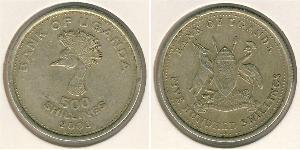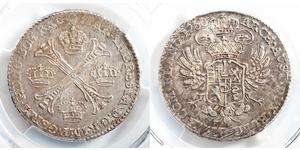(Venduta per $11.0)
1971, Canada, Elizabeth II. Silver "British Columbia" Specimen Dollar Coin. AU-
Mint Years: 1971 Denomination: 1 Dollar - British Columbia Reference: KM-60 (described as "Specimen"). Condition: Scratches in obverse, otehrwise a nice AU-UNC! Material: Silver (.500) Weight: 23 .53gm Diameter: 36mm
British Columbia (BC or B.C.; French: Colombie-Britannique) is the westernmost province of Canada, located between the Pacific Ocean and the Rocky Mountains. With an estimated population of 4.8 million as of 2017, it is Canada's third-most populous province.
The first British settlement in the area was Fort Victoria, established in 1843, which gave rise to the City of Victoria, at first the capital of the separate Colony of Vancouver Island. Subsequently, on the mainland, the Colony of British Columbia (1858–1866) was founded by Richard Clement Moody and the Royal Engineers, Columbia Detachment, in response to the Fraser Canyon Gold Rush. Moody was Chief Commissioner of Lands and Works for the Colony and the first Lieutenant-Governor of British Columbia: he was hand-picked by the Colonial Office in London to transform British Columbia into the British Empire's "bulwark in the farthest west", and "to found a second England on the shores of the Pacific". Moody selected the site for and founded the original capital of British Columbia, New Westminster, established the Cariboo Road and Stanley Park, and designed the first version of the Coat of arms of British Columbia. Port Moody is named after him.
In 1866, Vancouver Island became part of the colony of British Columbia, and Victoria became the united colony's capital. In 1871, British Columbia became the sixth province of Canada. Its Latin motto is Splendor sine occasu ("Splendour without Diminishment").
The capital of British Columbia remains Victoria, the fifteenth-largest metropolitan region in Canada, named for the Queen who created the original European colonies. The largest city is Vancouver, the third-largest metropolitan area in Canada, the largest in Western Canada, and the third-largest in the Pacific Northwest. In October 2013, British Columbia had an estimated population of 4,606,371 (about 2.5 million of whom were in Greater Vancouver). The province is currently governed by the British Columbia New Democratic Party in a minority government supported by the Green Party of British Columbia, led by John Horgan, who became premier as a result of a no-confidence motion on June 29, 2017.
British Columbia evolved from British possessions that were established in what is now British Columbia by 1871. First Nations, the original inhabitants of the land, have a history of at least 10,000 years in the area. Today there are few treaties and the question of Aboriginal Title, long ignored, has become a legal and political question of frequent debate as a result of recent court actions. Notably, the Tsilhqot'in Nation has established Aboriginal title to a portion of their territory, as a result of the recent Supreme Court of Canada decision (William [Tsilhqot'in Nation] v. British Columbia).
BC's economy is diverse, with service producing industries accounting for the largest portion of the province's GDP. It is the terminus of two transcontinental railways, and the site of 27 major marine cargo and passenger terminals. Though less than 5% of its vast 944,735 km2 (364,764 sq mi) land is arable, the province is agriculturally rich (particularly in the Fraser and Okanagan valleys), because of milder weather near the coast and in certain sheltered southern valleys. Its climate encourages outdoor recreation and tourism, though its economic mainstay has long been resource extraction, principally logging, farming, and mining. Vancouver, the province's largest city, serves as the headquarters of many western-based natural resource companies. It also benefits from a strong housing market and a per capita income well above the national average. While the coast of British Columbia and some valleys in the south-central part of the province have mild weather, the majority of its land mass experiences a cold-winter-temperate climate similar to the rest of Canada. The Northern Interior region has a subarctic climate with very cold winters. The climate of Vancouver is by far the mildest winter climate of the major Canadian cities, with nighttime January temperatures averaging above the freezing point.
Elizabeth II (Elizabeth Alexandra Mary; born 21 April 1926) is the queen regnant of sixteen independent sovereign states known informally as the Commonwealth realms: the United Kingdom, Canada, Australia, New Zealand, Jamaica, Barbados, the Bahamas, Grenada, Papua New Guinea, the Solomon Islands, Tuvalu, Saint Lucia, Saint Vincent and the Grenadines, Belize, Antigua and Barbuda, and Saint Kitts and Nevis. She holds each crown separately and equally in a shared monarchy, as well as acting as Head of the Commonwealth, Supreme Governor of the Church of England, and Head of State of the Crown Dependencies, British overseas territories, the Realm of New Zealand and the external territories of Australia. As a constitutional monarch, she is politically neutral and by convention her role is largely ceremonial.
When Elizabeth was born, the British Empire was a pre-eminent world power, but its influence declined, particularly after World War II, and the empire evolved into the modern Commonwealth of Nations. Her father, George VI, was the last Emperor of India. On his death in 1952, Elizabeth became Head of the Commonwealth, and queen of seven independent Commonwealth countries: the United Kingdom, Canada, Australia, New Zealand, South Africa, Pakistan, and Ceylon. During her reign, which at 57 years is one of the longest for a British monarch, she became queen of 25 other countries within the Commonwealth as they gained independence from Britain. She has been the sovereign of 32 individual nations, but half of them later became republics.
Elizabeth married Prince Philip, Duke of Edinburgh, in 1947. The couple have four children and eight grandchildren.

1vet Mohur Raj Britannico (1858-1947) Or ...
il gruppo ha 25 monete / 23 prezzi
Add coin to this group
1/2 Kronenthaler Paesi Bassi Argento
il gruppo ha 4 monete / 3 prezzi
⇑
3 Mark Impero tedesco (1871-1918) Argento Frederick Francis ...
il gruppo ha 5 monete / 4 prezzi
⇑

















-300-150-7X4hwJflo54AAAGLRptTnYLI.jpg)






